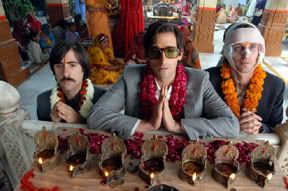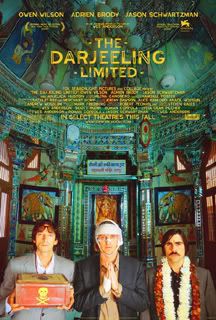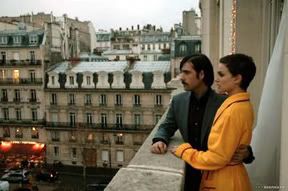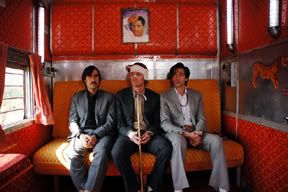Movies: The Darjeeling Limited
Jack: "I wonder if the three of us would've been friends in real life. Not as brothers, but as people."

Brotherhood is the focus of Wes Anderson's beautiful fifth film, The Darjeeling Limited. I'm a gigantic fan of the works of Wes Anderson, and I'm glad I saw this one five days before the end of 2007 so I could confidently declare it one of my favorites of the year. It's the tale of three brothers who come together a year after their father's funeral for a "spiritual quest" led by the quixotic Francis (Owen Wilson) on a train ride in India. Lothario Jack (Jason Schwartzman) and nervous Peter (Adrien Brody) join Francis for a wild ride through their own hopes and fears in India's hinterlands.
 The Darjeeling Limited is like Anderson's other movies -- you'll either find it a bit fussy and mannered, or you'll fall for its whimsy whole-heartedly. I think it's up there with his best work (although I pretty much consider all his work near his best, especially the underrated The Life Aquatic). Every one of Anderson's major films -- Rushmore, The Royal Tenenbaums, The Life Aquatic -- focus on the notion of family and grief being intertwining vines, of the bubbling traumas that link in family interactions. This is an utterly inexhaustible subject, of course, and Anderson has mined it well. But he also adds his kind of precious and finicky storybook sensibility to it all, investing a ton of energy in the environments, stylizing every gesture and moment. Judging from The Royal Tenenbaums DVD, Anderson spends a lot of time thinking about things like the wallpaper on sets. The Darjeeling Limited is his first movie to take place entirely in another country, and visually, it's a colorful dazzle.
The Darjeeling Limited is like Anderson's other movies -- you'll either find it a bit fussy and mannered, or you'll fall for its whimsy whole-heartedly. I think it's up there with his best work (although I pretty much consider all his work near his best, especially the underrated The Life Aquatic). Every one of Anderson's major films -- Rushmore, The Royal Tenenbaums, The Life Aquatic -- focus on the notion of family and grief being intertwining vines, of the bubbling traumas that link in family interactions. This is an utterly inexhaustible subject, of course, and Anderson has mined it well. But he also adds his kind of precious and finicky storybook sensibility to it all, investing a ton of energy in the environments, stylizing every gesture and moment. Judging from The Royal Tenenbaums DVD, Anderson spends a lot of time thinking about things like the wallpaper on sets. The Darjeeling Limited is his first movie to take place entirely in another country, and visually, it's a colorful dazzle.  First off, you simply have to watch Darjeeling in tandem with the short film Hotel Chevalier, a prologue to the events of the film. (Apparently in the US Darjeeling actually played in theaters without Hotel Chevalier, kind of like lopping off the first 10 minutes of the movie.) Chevalier is a very European, brooding and enigmatic opening act that focuses on Jack Whitman and his estranged girlfriend (a luminous and battered Natalie Portman). It's a brief scene but it kind of sets up the themes of the film – trying to leave the past behind, but trapped in its waves.
First off, you simply have to watch Darjeeling in tandem with the short film Hotel Chevalier, a prologue to the events of the film. (Apparently in the US Darjeeling actually played in theaters without Hotel Chevalier, kind of like lopping off the first 10 minutes of the movie.) Chevalier is a very European, brooding and enigmatic opening act that focuses on Jack Whitman and his estranged girlfriend (a luminous and battered Natalie Portman). It's a brief scene but it kind of sets up the themes of the film – trying to leave the past behind, but trapped in its waves. Francis: "I want us to become brothers again -- and to become enlightened."
Watching Darjeeling on the big screen, I kept catching the loving details Anderson added to the setting. His movies are about setting as much as they are about character, a meticulousness you don't tend to see often in modern movies. I've never been to India and don't know how much of Darjeeling's kitschy design is merely Anderson's fantasy verison of India, but either way it's a beautiful evocation of a place. The Darjeeling Limited train, with its endless filigrees, religious icons and colorful characters (an angry manager, a sexy stewardess), is one of the great film train settings.
 Owen Wilson is an actor who often cruises along amiably playing the same indignant, good-natured clown but Anderson's movies bring out his best instincts. He's great here, a control freak who's impotent, battered in a mysterious accident and covered with bandages for most of the movie (it's a shame the real-life problems in Wilson's life have overshadowed what I'd call one of his best roles). Schwartzman returns to the Anderson fold for the first time since Rushmore with a great turn as Jack, a would-be writer, barefoot and mustached, a ladies' man despite his short, vaguely porn-star appearance. Oscar winner Brody is perhaps the most mysterious of the brothers, Peter, who's run away from fatherhood to India. In cameos you'll find familiar Anderson repertory players like Bill Murray and Angelica Huston, but the three brothers carry most of the movie and their jocular surly bonding propels it. I'd say this is the funniest of Anderson's films despite the undercurrent of tragedy which swims to the fore in the final acts.
Owen Wilson is an actor who often cruises along amiably playing the same indignant, good-natured clown but Anderson's movies bring out his best instincts. He's great here, a control freak who's impotent, battered in a mysterious accident and covered with bandages for most of the movie (it's a shame the real-life problems in Wilson's life have overshadowed what I'd call one of his best roles). Schwartzman returns to the Anderson fold for the first time since Rushmore with a great turn as Jack, a would-be writer, barefoot and mustached, a ladies' man despite his short, vaguely porn-star appearance. Oscar winner Brody is perhaps the most mysterious of the brothers, Peter, who's run away from fatherhood to India. In cameos you'll find familiar Anderson repertory players like Bill Murray and Angelica Huston, but the three brothers carry most of the movie and their jocular surly bonding propels it. I'd say this is the funniest of Anderson's films despite the undercurrent of tragedy which swims to the fore in the final acts.There's a warmth to The Darjeeling Limited and its battling brothers that is nearly the equal of The Royal Tenenbaums, and in some ways it feels like Anderson's trying to wrap up his big themes of screwed-up relationships and forgiveness. He's at the point in his career where he could either begin repeating himself with diminishing results or start heading off on new paths. There's a lot of old Anderson in here, but enough hints of a new perspective that I feel like this train ride is a step forward. Either way, I get enough pleasure out of his flicks that I'm along for whatever journey Wes heads out on.
Peter: "I love the way this country smells. I'll never forget it. It's kind of spicy."

No comments:
Post a Comment